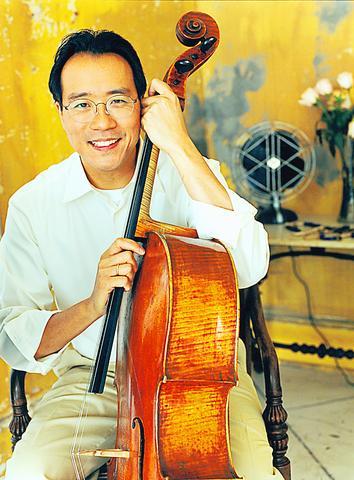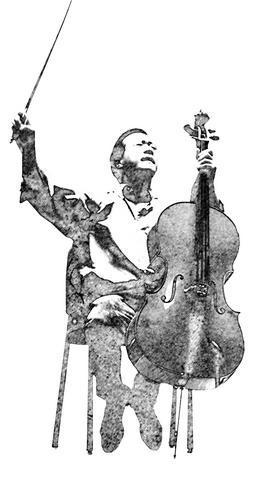People in Taiwan have been big fans of Bossa Nova in recent years. Antonio Carlos Jobim and Joao Gilberto have been musical fixtures in bars and restaurants and the Japanese singer Lisa Ono has found a inexhaustible fan base here.
The local fascination with Brazilian music, however, seldom stretches beyond the easy-listening variations of Brazil's rich music traditions. That could soon change as classical superstar, Chinese-American cellist Yo-Yo Ma is going to enchant Taipei this Tuesday with an all-star concert performing tracks from his latest album which presents a wide spectrum of Brazilian music.
Apart from his long-time collaborator, pianist Kathryn Stott, An Evening of Latin American Music (

PHOTO COURTESY OF SONY MUSIC ENTERTAINMENT
Meaning "thank you Brazil" in English, Obrigado Brazil encompasses a variety of Brazilian musical styles. Among the up-beat pop, smooth urban beats and European classical works is the folk song tradition of choro, which will form the main part of the concert. Samba and bossa nova may be widely identified with Brazil today, but both have roots in choro.
The style started among street musicians who put together African rhythms, Portuguese popular musical styles and European salon music into serenades in the 1870s. Heitor Villa-Lobos, Brazil's most celebrated classical composer, whose works are featured at the concert, based his compositions on choro. Derived from "chorar," the Portuguese verb for "to cry," choro is infectiously sorrowful as Brazilian poet and bossa nova lyricist Vincius de Moraes once wrote about the genre -- "Sadness has no end; happiness does."
Different from the always smiling cellist's classical performances, which are mostly of a sunny tone, there's more of a mood swing and emotional complexity in Obrigado Brazil. "I've always loved Brazilian music," Ma said before the album's release in July. "There's an undercurrent of sensuality in it that is incredibly seductive.

It's a place between the conscious and the unconscious -- a place where the rational and the irrational meet."
Musicians supporting Ma at the concert include percussionist Cyro Baptista, clarinetist Paquito D'Rivera, singer/guitarist Rosa Passos, and guitarists Semrgio and Odair Assad, the same team as on the album.
"All of the musicians on this album are absolute masters of their specific genres of Brazilian music and everybody is incredibly generous," Ma said before the album release, "The recording session was like one long party -- really warm and festive."
The concert will open with Brazilian keyboard artist Cesar Camargo Mariano's Cristal, a cheerfully elegant piece which Ma will perform with Stott. The duo will then switch to a
melancholic mood with Villa-Lobos' classical number Alma Brasileira, or "Brazilian Soul."
Villa-Lobos was discovered by late master pianist Arthur Rubinstein playing cello in a theater in Rio de Janeiro. Rubinstein arranged for Villia-Lobos to seek a better career in Paris. But the self-taught musician, whose first musical book was the map of Brazil, later chose to return and become the first world-famous Brazilian composer.
Antonio Carlos Jobim's works are also part of this concert. Baptista will join Ma and Stott on a poignant rendition of Chega de Saudade, as the siren-like Passos lends her subtle and sincere vocals to the lingering music. In O Amor em Paz, another well-known bossa nova number, the versatile Assads will drop in an intoxicating bit of romance suitable for an autumn evening.
As this is a Latin American music concert, Ma will also perform the works of Astor Piazzolla, such as the heart-rending Zita and the emotionally intense Tango Suite. Closing the concert will probably be Waldir Azevedo's Brasileirinho, a well-known choro piece from the 1940s. Ma, together with D'Rivera and Baptista, create such flowing and cheerful renditions of the melodies that the audience will find it hard to sit still, as in the case of previous concerts on Ma's tour.
The ability to bring out the unexpected in musicians from different cultures has been Ma's trademark since his 1996 collaboration with Mark O'Conner and Edger Meyer on the album Appalachia Waltz, where there is a surprising chemistry between classical music and folk music, country blues and jazz from America.
Enlisting help from outstanding musicians around the world, Ma founded in 1988 the Silk Road Project, an artistic, cultural and educational organization to study "the ebb and flow of ideas along" the ancient trade route. The resulting Silk Road Ensemble explores the boundaries between innovation and tradition, in Mongolian and Middle Eastern music.
Ma's first recording of South American music, Soul of the Tango interpreted the works of Argentina's master of the nuevo tango, Astor Piazzolla, and helped win one of his 14 Grammy Awards. The same production team is behind his new album.
Touring for the album started in August. It has taken Ma and the ensemble through Amsterdam, London and various stops in the US. After the Taipei show, they are due to perform in Japan, before more touring in the US throughout the fall.
Yo-Yo Ma and seven other musicians will perform An Evening of Latin American Music at 7:45pm, Oct. 28 at the National Concert Hall (國家音樂廳 ). Tickets range from NT$1,800 to NT$3,600 and are available at Era ticketing outlets.

On April 26, The Lancet published a letter from two doctors at Taichung-based China Medical University Hospital (CMUH) warning that “Taiwan’s Health Care System is on the Brink of Collapse.” The authors said that “Years of policy inaction and mismanagement of resources have led to the National Health Insurance system operating under unsustainable conditions.” The pushback was immediate. Errors in the paper were quickly identified and publicized, to discredit the authors (the hospital apologized). CNA reported that CMUH said the letter described Taiwan in 2021 as having 62 nurses per 10,000 people, when the correct number was 78 nurses per 10,000

As we live longer, our risk of cognitive impairment is increasing. How can we delay the onset of symptoms? Do we have to give up every indulgence or can small changes make a difference? We asked neurologists for tips on how to keep our brains healthy for life. TAKE CARE OF YOUR HEALTH “All of the sensible things that apply to bodily health apply to brain health,” says Suzanne O’Sullivan, a consultant in neurology at the National Hospital for Neurology and Neurosurgery in London, and the author of The Age of Diagnosis. “When you’re 20, you can get away with absolute

When the South Vietnamese capital of Saigon fell to the North Vietnamese forces 50 years ago this week, it prompted a mass exodus of some 2 million people — hundreds of thousands fleeing perilously on small boats across open water to escape the communist regime. Many ultimately settled in Southern California’s Orange County in an area now known as “Little Saigon,” not far from Marine Corps Base Camp Pendleton, where the first refugees were airlifted upon reaching the US. The diaspora now also has significant populations in Virginia, Texas and Washington state, as well as in countries including France and Australia.

May 5 to May 11 What started out as friction between Taiwanese students at Taichung First High School and a Japanese head cook escalated dramatically over the first two weeks of May 1927. It began on April 30 when the cook’s wife knew that lotus starch used in that night’s dinner had rat feces in it, but failed to inform staff until the meal was already prepared. The students believed that her silence was intentional, and filed a complaint. The school’s Japanese administrators sided with the cook’s family, dismissing the students as troublemakers and clamping down on their freedoms — with